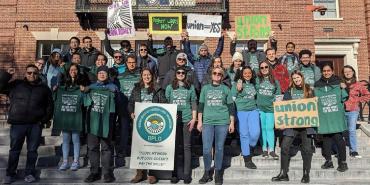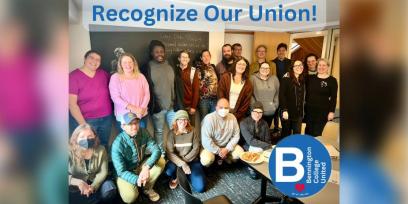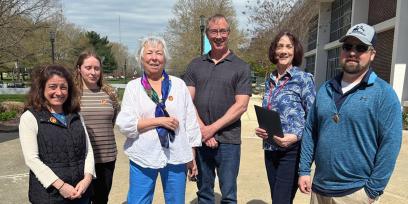Higher education organizing has been going full tilt this spring, swelling the ranks of AFT members and strengthening the union’s position as the largest faculty and staff union in the country. Behind each of these new affiliates are the people who work every day to make the education experience of students in public colleges and universities—people who deserve decent pay, job security, academic freedom and a voice in the workplace—the best it can be.
Brown University postdocs
Joining the growing union movement at Brown University, the Brown Postdoc Labor Organization became the first union for postdoctoral researchers and dean’s faculty fellows to unionize on campus. The administration voluntarily recognized the union after signatures from a majority of those eligible for membership were validated, forgoing the usual voting process.
BPLO joins the Rhode Island Federation of Teachers and Health Professionals/AFT Local 6516, in company with Brown’s Labor Organization of Community Coordinators, Graduate Labor Organization and Teaching Assistant Labor Organization. That union solidarity is expected to serve workers on campus well. “Our generation [is] realizing that you can’t just rely on the benevolence of institutions to protect your rights,” postdoctoral research fellow and BPLO organizer Sarah Neville told the Brown Daily Herald. “You have to stand up and be in solidarity with your co-workers to get what you deserve.”
California College of the Arts ranked faculty
In January, faculty at the California College of the Arts won voluntary recognition from the college for its union, CCA Ranked Faculty United. The 130 faculty of the California College of the Arts are framing their commitment with the principle that their working conditions are students’ learning conditions; they are focused on fair compensation and job security, working collaboratively with college leadership to ensure a better future for the college community and fair and transparent decision-making. Their school, founded in 1907, is a private, not-for-profit art school and part of a growing movement of private art schools that are unionizing.
University of Illinois Chicago research assistants
In March, research assistants voted unanimously to join the graduate workers union at the University of Illinois Chicago, the Graduate Employees Organization. It’s a landmark move: The RAs were excluded by state law from unionizing until 2019 because they were not recognized as workers; now they are the first graduate researchers at a public university in their state to unionize. GEO now represents nearly 2,500 teaching, graduate and research assistants. It is one of the first graduate employee unions in the country and began organizing in 1970. The union has been a leader on the following issues, listed on its website: premium-free health insurance, tuition waivers, transgender healthcare, harassment protections, police abolition and more.
Bennington College
Faculty and staff at this private college in Vermont unionized in February, and administrators voluntarily recognized them as the bargaining unit for longtime faculty as well as staff and campus safety workers. Bennington College United says its goals are to “bargain collectively with management as equals, to make real, meaningful improvements on workplace issues that unite us.” Issues members hope to address include workload, turnover and compensation; pay equity across departments; better healthcare; and a “rock-solid recruitment plan” to address enrollment.
University of Michigan-Flint tenure and tenure-track faculty
Tenured and tenure-track faculty at the University of Michigan-Flint were recognized by administrators this spring. Their union, UMF-AAUP-AFT, joins AFT siblings in the Lecturers’ Employee Organization, which spans all three University of Michigan campuses and represents nontenure-track faculty including lecturers, librarians, archivists and curators. Organizers hope to address issues including workload, campus climate, pay equity and protecting the right to speak out on campus issues. “We know that we can build a better university together and that this happens when faculty are respected,” union leaders wrote to campus staff. “Now the real work of sustaining this movement begins.” The union will first come to agreement about who will be eligible to join the unit; then the voting can start.
University of Montana graduate workers
Card check complete, awaiting official recognition
In April, a supermajority of the 358 graduate workers at the University of Montana signed union cards. The overwhelming card check means an election is not required; organizers are hoping administrators will voluntarily negotiate with the union as they await the state’s certification. “We seek to improve working and living conditions for graduate employees through a collaborative and non-adversarial relationship with the university administration,” the union wrote in a letter to administrators, noting that low research and teaching stipends are not enough to secure basics like food, housing and healthcare. The union also pointed out that recruiting high-quality graduate students “from diverse backgrounds” is more difficult with low pay. “Only when basic needs are met can graduate employees excel in their roles as educators and researchers, supporting UM’s status as a Tier 1 Research Institution.”
Chesapeake Community College faculty
This spring full time faculty at Chesapeake Community College in Queen Anne’s County, Md., became the fourth community college in the state to join United Academics-Maryland, affiliated with AFT Maryland, after a change in state legislation allowed community college faculty to unionize. “It’s exciting to know that we are striving together as a faculty and negotiating with administration to ensure that working conditions will remain fair and equitable here at Chesapeake College,” said Eleanor Welsh, a professor of English.
“The changing landscape of higher education demands faculty have a voice and a seat at the table,” said AFT Maryland President Kenya Campbell. “It is vital that educators who will be teaching college graduates of the future be a part of the decision-making process regarding their work and the future of their institution.” Other colleges that recently joined the AFT in Maryland are: Prince George’s Community College, Howard Community College and Frederick Community College.
[Virginia Myers]



